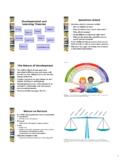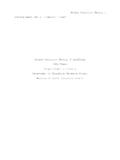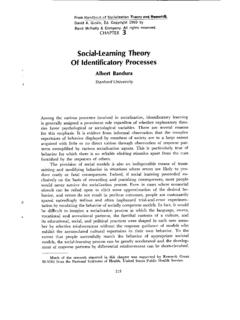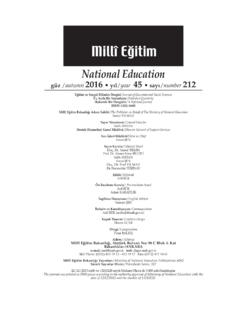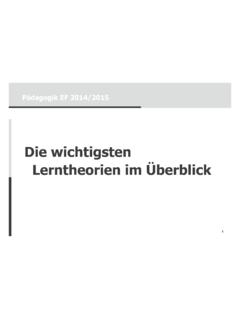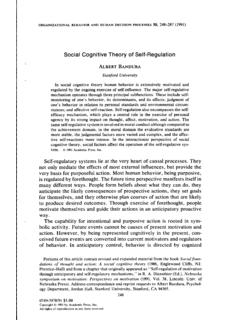Transcription of The Effects of Extra-Curricular Activities on …
1 Extra-Curricular Activities 1 Running head: THE Effects OF Extra-Curricular ACTIVITIESThe Effects of Extra-Curricular Activitieson Student s Perceived Academic Self-Efficacy Extra-Curricular Activities 2 AbstractThe differences in academic self-efficacy scores between students who participated in Extra-Curricular Activities and students who did not participate in Extra-Curricular Activities were examined. It was hypothesized that students who participated in Extra-Curricular Activities would score higher, on an academic self-efficacy scale, than students who did not participate in Extra-Curricular Activities . As expected academic self-efficacy scores were significantly higher in the Extra-Curricular group. These finding suggest that participation in Activities outside of the school, will produce positive Effects on students perceived academic Activities 3 The Effects of Extra-Curricular Activitieson Student s Perceived Academic Self-EfficacySelf-efficacy is defined as a person s belief about their capabilities to achieve a certain level of performance (Bandura, 1994).
2 This belief can influence events that affect a person s life. Perceived self-efficacy determines how people feel, think, motivate themselves, and behave. It influences the choices they make, the effort they put forth, how persistent they are when confronted by obstacles, and how they feel. A strong sense of self-efficacy can enhance a person s accomplishments in many ways. A strong sense of self-efficacy can influence a person s aspirations; increase their level of motivation and their perseverance in the face of difficulties and setbacks (Bandura, Barbaranelli, Caprara, & Pastorelli, 1996). Bandura et al. (1996) state that unless a person believes that they can produce a desired effect by their actions, they have little incentive to act. A child s self-efficacy can affect the different aspects of their lives as well. Bandura et al. (1996, p.)
3 1206) states that a child s belief in their efficacy to regulate their own learning Activities and to master difficult subject matters affect their academic motivation, interest, and scholastic achievement . A child s perceived self-efficacy affects adaptation and can influence perseverance and resilience to adversity (Bandura, Barbaranelli, Caprara, & Pastorelli, 2001). The benefits of having an increased level of self-efficacy many benefit a child s life in many ways. Helping create this better sense of self-efficacy may be achieved in numerous ways. A supportive and encouraging social network positively influences a child s sense of factors that influence a child s academic achievement are prosocialness and Extra-Curricular Activities 4positive interpersonal relationships. Positive interpersonal relationships have a direct influence on a child s life.
4 The benefits of high quality interpersonal relationships are important in a child s capacity to function effectively including their academic lives (Martin & Dowson, 2009). Equally as important is the child s prosocial behavior. Prosocialness is portrayed in cooperativeness, helpfulness, ability to share, and empathy (Caprara, Barbaranelli, Pastorelli, Bandura, & Zimbardo, 2000). Individuals learn about themselves during social interactions with others. They learn what is needed to fit into a group. Martin and Dowson (2009) state that through social interactions a person develops beliefs and values. It is within this relatedness that teaches students how to function effectively in academic environments. These beliefs and values direct behavior in the form of enhanced persistence, goal striving and self-regulation (Martin & Dowson, 2009). Caprara et al.
5 (2000) found that early prosocial behavior strongly predicted levels of academic achievement. Caprara et al. (2000) also found that prosocialness fosters mutually supportive social and intellectual relationships. It also reduces vulnerability to depression and other problem behaviors, which undermine the pursuit of academic Activities . Martin and Dowson (2009) further state that relatedness affects a child s motivation by creating positive feelings of self-worth and self-esteem, which are related to continued achievement motivation. A child s academic achievement is shaped by their perceived academic ability, social and self-regulatory efficacy and academic aspirations. The vicarious influence from other people through positive social models is a key influence on self-efficacy. Bandura (as cited in Martin and Dowson, 2009) states that self-efficacy can be achieved through the communication with significant others as well as through observation of problem solving techniques.
6 Extra-Curricular Activities 5 One way for students to promote and practice their prosocial and interpersonal relationships is to be involved in extracurricular Activities outside of school. Additionally, the involvement of extracurricular Activities has other benefits. In a study of academically successful urban high school males, Hibert (2000) found that involvement in youth organizations after school gave students the awareness that they had options in their lives outside of their urban environments. These organizations were perceived by these young men as safe places where they could be with their peers and engage in Activities centered on cooperative team building and reinforced with consistent adult support (Hibert, 2000, p. 93). These organizations provided opportunities for these students to build a sense of self-efficacy in addition to providing success in different types of Activities .
7 McLaughlin (cited in Hibert, 2000) found that urban teenagers who participated in extracurricular Activities built a positive sense of self through their accomplishments and successes within the program. Perry-Burney and Takyi (2002) found that girls who are involved in team sports tend to have a higher sense of self-confidence while playing. These feelings resulted in higher grades academically, increased participation in extracurricular Activities in school, and more involvement at home. It was found that these behaviors were demonstrated because of their high level of self-efficacy. These girls were also found to have a clearer and more consistent view of their long-term goals. It was also found in Perry-Burney and Takyi s study that not only did these girls have higher grades, they also scored higher on standardized tests when compared to their non-athletic (2000) found that young urban males in his study who were involved in extracurricular Activities felt that their involvement allowed them to develop their talents Extra-Curricular Activities 6and exposed them to another world outside of their urban community.
8 Furthermore, they began to see themselves as valued individuals. This perception enabled their belief in self to become stronger. This in turn led them to believe they were better prepared to succeed. It was concluded by Hibert (2000) that the most important factor influencing the success of the urban males in his study was a strong belief in self. The students that participated in this study claimed that it was in fact their membership in the schools swim team that fostered their strong sense of self and had a powerful impact on shaping their belief in self. In addition, Perry-Burney and Takyi (2002) concluded from their survey that teenage girls from suburban schools who participated in team sports have a higher sense of self-confidence; they also observed improvement in GPA and the desire to attend , Eccles, and Stone as well as other researchers (as cited in Martin and Dowson 2009) found that extracurricular Activities such as sports, music, dance, clubs, and church groups are positive influences in a child s life.
9 This positive influence affects their educational, social and emotional lives. This sense of belonging is a key factor that helps create positive Effects in a child s life. The adults involved in these extracurricular Activities model effective behaviors, and help develop social skills that in turn build a student s sense of control (Martin & Dowson, 2009). Caprara, Barbaranelli, Pastorelli, Bandura, & Zimbardo (2000) contend that the importance of investing resources to develop and promote children s prosocialness will enhance other realms of their lives. Not only will it enhance the social aspects of their lives, but will also facilitate subsequent academic success. Moreover, it can generate additional gains in self-regulation and Activities 7 Given the previous research that found that involvement in Activities outside of school could increase a child s sense of belongingness and self-confidence, the research on how it affects self-efficacy is limited.
10 The current research seeks to extend the previous findings by investigating the relationship between participation in extracurricular Activities and how they affect academic self-efficacy. More specifically it is hypothesized that those students who are involved in Extra-Curricular Activities will display higher academic self-efficacy when compared to students who do not participate in any Extra-Curricular sample consisted of four intact classes from fifth to eight grades. The sample included male (n=29) and female (n=35) students from these classes. They all attend a catholic elementary school in the Stapleton area of Staten Island, New York. The school is a Title I school, , at least 40% of the student body qualifies for either free or reduced-priced school lunches. The mean participant age is years, and the age range is 11 to 15 years old.

